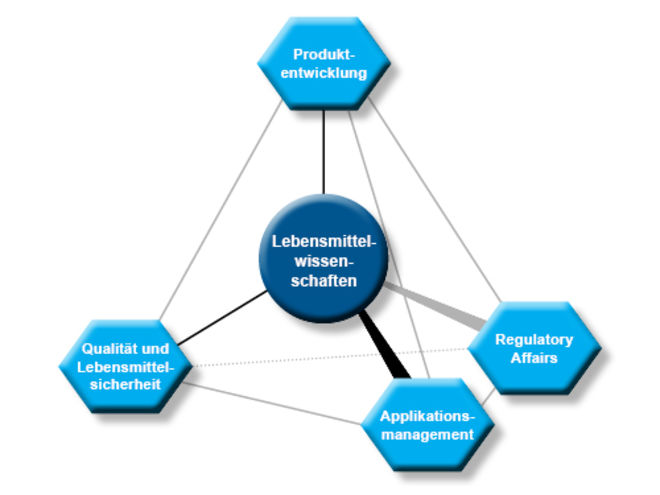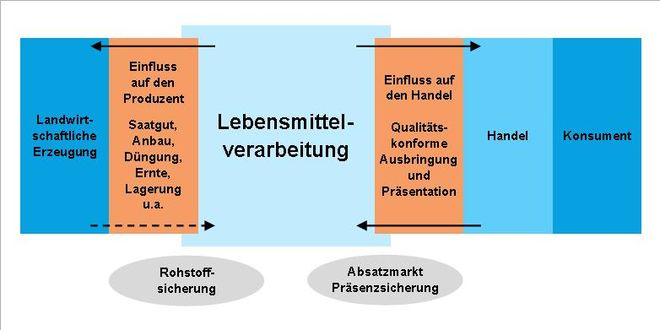Check out the details of the Bachelor's degree programme in Food Science on this page.
Do you have further questions and would like a detailed consultation? Please get in touch with our contacts.

Check out the details of the Bachelor's degree programme in Food Science on this page.
Do you have further questions and would like a detailed consultation? Please get in touch with our contacts.
Food: develop - process - make safe
Our foods consist of components of natural raw materials of plant or animal origin. In order to produce tasty, nutritionally balanced, healthy and safe foods from these raw materials, it is necessary to recognize, influence and control a large number of external influences on the raw materials as well as interactions between processing conditions and foods.
Food science is concerned with the resulting questions and the search for acceptable solutions for practical application. The approach is a comprehensive approach taking into account scientific knowledge from special disciplines of food science such as food microbiology, food chemistry and food technology as well as agricultural science and commodity science on the one hand and the knowledge of biochemical and physiological effects of food ingredients on the other hand. This approach is complemented by content-related consideration of societal demands on food and its marketing.
Typical tasks that food scientists deal with are, for example:
Core study programme - in-depth study programme - optional minor study programme
The Bachelor's degree programme in Food Science consists of a two-year (4 semesters) core study programme and an in-depth study programme building on this. In accompanying study projects and events, you will be taught project and methodological skills in addition to your technical qualifications.
You can choose between a six-semester or seven-semester version of the studies. The seven-semester variant includes a so-called minor study in the 6th/7th semester. The minor study can include a
semester. This enables you to gain professional or/and international experience already during the regular studies and to establish contacts for your further professional career.
With the Bachelor's thesis and the subsequent oral examination, you can complete the studies after the sixth or seventh semester with the degree "Bachelor of Science".
In the core studies , you will first be taught general foundation courses in Business Administration and Economics, Mathematics, Physics, Chemistry and Biology. These form the basis for the further course of your technically and scientifically oriented studies in food science. The core studies are rounded off with food-specific content in biology, chemistry, technology and business organization.

After the core studies, you will specialize in the in-depth studies starting in the 5th semester. This is possible in the four specializations
Depending on the individual planning of your advanced and elective courses, you can either intensify one of the specializations through specific optional modules or place your specialization on a broader basis by selecting modules from another specialization. You can find out more about the contents of the individual specializations from the module handbook.
In the accompanying project studies, you will gain experience in project assignments from the first semester onwards - a form of work that is regularly and frequently encountered in today's professional world. In the projects, solutions are developed for food science issues that result from operational practice - it is not uncommon for projects to be worked on in direct cooperation with companies.
The Study and Examination Regulations contain the legal framework conditions of the Degree programme with regard to the study requirements, the implementation, taking of examinations, etc.
The module handbooks of the Degree programmes help you to inform yourself about the content of courses and module compositions.
Link to the module handbooks of the Degree programmes of FB05

The target labor market for professions with a background in food science is the food and nutrition industry. This ranges from the agricultural production and extraction of food to its processing, trading and delivery to the consumer. Included are the various suppliers and service specialists.
The Bachelor's degree programme in Food Science is oriented towards the requirements of the target job market and is thus designed to provide you with the greatest possible opportunity for qualified jobs
Our study program is designed to make you fit for jobs in middle management in companies in the food industry and its suppliers. Possible employers for our graduates include:
Typical job responsibilities you may have as a graduate of the Food Sciences Degree programme with these employers include:
Depending on the chosen specialization, you will be particularly specialized for individual task areas. However, the cut of these task areas varies depending on the corporate structure of the respective employer. Therefore, a chosen advanced course does not exclude that you can also work in other task areas mentioned above.
A student in the Faculty of Food, Nutrition and Hospitality Sciences shares what excites him about food science studies in a radio interview.
In this radio report on the lecture "Food Law" by our university teacher / lecturer for food science, Prof. Dr. Georg Wittich, you will get a small impression of what has to be considered in the context of quality assurance and safety of food.

Rheydter Str. 277
Consultation hours are by appointment and are available by presence, telephone and Zoom. The appointment is made by e-mail.
Rheydter Str. 277

Looking for the right counseling center? Our counseling navigator will help you find it.